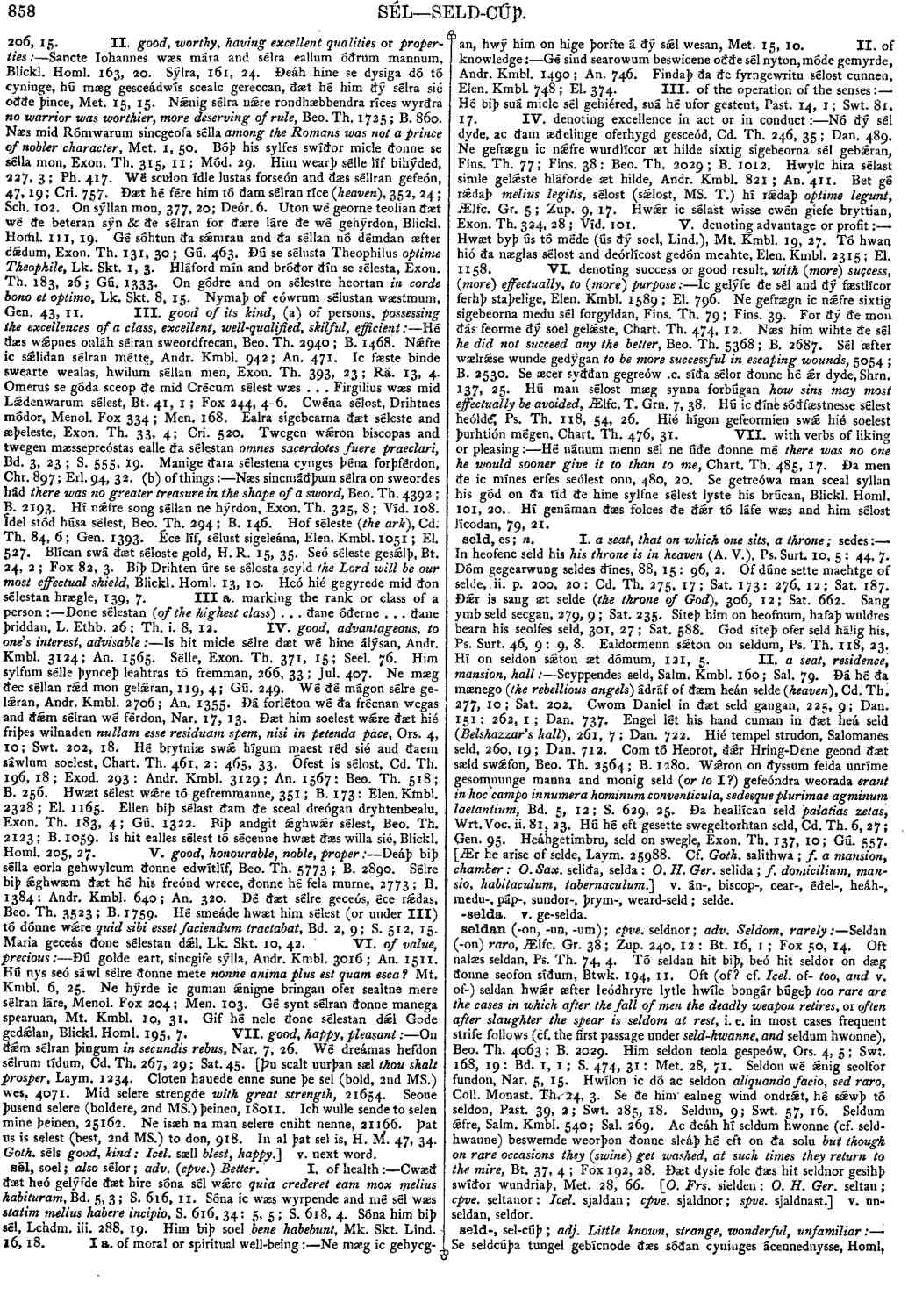sél
- adverb
-
Cwæð ðæt heó gelýfde ðæt hire sóna sél wǽre
quia crederet eam mox melius habituram,
- Bd. 5, 3 ; S. 616, 11.
-
Sóna ic wæs wyrpende and mé sél wæs
statim melius habere incipio,
- S. 616, 34 : 5, 5 ; S. 618, 4.
- Sóna him biþ sél. Lchdm. iii. 288, 19.
-
Him biþ soel
bene habebunt,
- Mk. Skt. Lind. 16,18.
- Ia. of moral or spiritual well-being :-- Ne mæg ic gehycg*-**
-
Gé sind searowum beswicene oððe sél nyton, móde gemyrde,
- Andr. Kmbl. 1490 ; An. 746.
-
Findaþ ða ðe fyrngewritu sélost cunnen,
- Elen. Kmbl. 748 ; El. 374.
-
Hé biþ suá micle sél gehiéred, suá hé ufor gestent,
- Past. 14, 1 ; Swt. 81, 17.
-
Nó ðý sél dyde, ac ðam æðelinge oferhygd gesceód,
- Cd. Th. 246, 35 ; Dan. 489.
-
Ne gefrægn ic nǽfre wurðlícor æt hilde sixtig sigebeorna sél gebǽran,
- Fins. Th. 77 ; Fins. 38 : Beo. Th. 2029 ; B. 1012.
-
Hwylc hira sélast simle gelǽste hláforde æt hilde,
- Andr. Kmbl. 821 ; An. 411.
-
Bet gé rǽdaþ melius legitis, sélost (sǽlost, MS. T.) hí rǽdaþ
optime legunt,
- Ælfc. Gr. 5 ; Zup. 9, 17.
-
Hwǽr ic sélast wisse cwén giefe bryttian,
- Exon. Th. 324, 28 ; Víd. 101.
-
Hwæt byþ ús tó méde (ús ðý soel,
- Lind.), Mt. Kmbl. 19, 27.
-
Tó hwan hió ða næglas sélost and deórlícost gedón meahte,
- Elen. Kmbl. 2315 ; El. 1158.
-
Ic gelýfe ðe sél and ðý fæstlícor ferhþ staþelige,
- Elen. Kmbl. 1589 ; El. 796.
-
Ne gefrægn ic nǽfre sixtig sigebeorna medu sél forgyldan,
- Fins. Th. 79 ; Fins. 39.
-
For ðý ðe mon ðás feorme ðý soel gelǽste,
- Chart. Th. 474, 12.
-
Næs him wihte ðe sél
he did not succeed any the better,
- Beo. Th. 5368 ; B. 2687.
-
Sél æfter wælrǽse wunde gedýgan
to be more successful in escaping wounds,
5054 ;- B. 2530.
-
Se æcer syððan gegreów .c. síða sélor ðonne hé ǽr dyde,
- Shrn. 137, 25.
-
Hú man sélost mæg synna forbúgan
how sins may most effectually be avoided,
- Ælfc. T. Grn. 7, 38.
-
Hú ic ðíne; sóðfæstnesse sélest heólde,
- Ps. Th. 118, 54, 26.
-
Hié hígon gefeormien swǽ hié soelest þurhtión mégen,
- Chart. Th. 476, 31.
-
Hé nánum menn sél ne úðe ðonne mé
there was no one he would sooner give it to than to me,
- Chart. Th. 485, 17.
-
Ða men ðe ic mínes erfes seólest onn,
- 480, 20.
-
Se getreówa man sceal syllan his gód on ða tíd ðe hine sylfne sélest lyste his brúcan,
- Blickl. Homl. 101, 20.
-
Hí genáman ðæs folces ðe ðǽr tó láfe wæs and him sélost lícodan,
- 79, 21.
Bosworth, Joseph. “sél.” In An Anglo-Saxon Dictionary Online, edited by Thomas Northcote Toller, Christ Sean, and Ondřej Tichy. Prague: Faculty of Arts, Charles University, 2014. https://bosworthtoller.com/27362.
Checked: 0